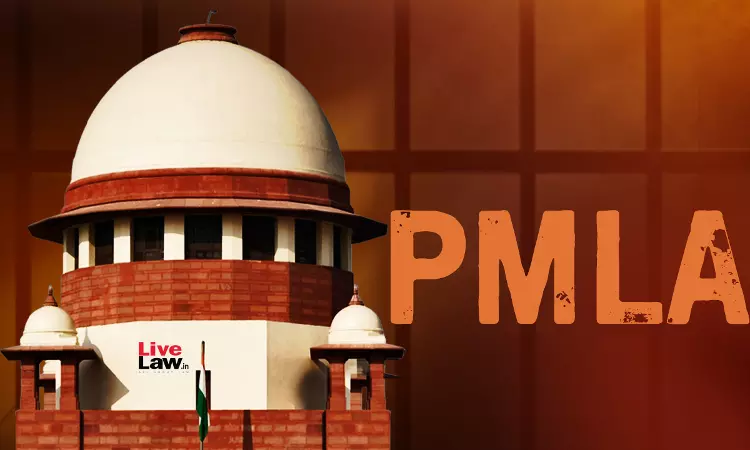- Home
- /
- Top Stories
- /
- Whether Discharge In Predicate...
Whether Discharge In Predicate Offence Automatically Invalidates PMLA Proceedings? Supreme Court To Consider
Debby Jain
14 July 2025 6:55 PM IST
The Supreme Court is set to consider the issue as to whether discharge in the predicate/scheduled offence would automatically invalidate proceedings initiated under the Prevention of Money Laundering Act.A bench of Justices Surya Kant and Joymalya Bagchi is dealing with the challenge to a Jammu and Kashmir and Ladakh High Court order, which held that discharge in the predicate offence does...
The Supreme Court is set to consider the issue as to whether discharge in the predicate/scheduled offence would automatically invalidate proceedings initiated under the Prevention of Money Laundering Act.
A bench of Justices Surya Kant and Joymalya Bagchi is dealing with the challenge to a Jammu and Kashmir and Ladakh High Court order, which held that discharge in the predicate offence does not automatically invalidate PMLA proceedings.
Notice was issued on the petition in the parting Court working days by a bench of Justices PK Mishra and Manmohan.
Today, Senior Advocate Narendra Hooda appeared for the petitioner and submitted that he was summoned under Section 50 of PMLA after being discharged in the predicate offence. The senior counsel further pressed for interim relief.
Hearing him, the bench directed that no coercive action shall be taken against the petitioner, subject to his cooperating with the authorities.
Niket Kansal, a 27-year-old resident of Delhi and the operational head of M/s NK Pharmaceuticals Pvt Ltd., was implicated in the unlawful diversion of Codeine-Based Cough Syrup (CBCS) "Cocrex". Regarding the same, FIRs were registered by Narcotics Control Bureau (NCB) and complaints filed before the Special NDPS Court, Jammu, alleging illicit manufacturing and marketing of the CBCS by Kansal and others.
However, the Trial Court discharged Kansal and 2 other accused, citing lack of material evidence to frame charges. It was noted that the only evidence against Kansal was a confessional statement recorded under Section 67 of NDPS Act, without corroboration. The Court observed that no cogent or substantive evidence linking Kansal to any conspiracy or commission of the alleged offences existed.
Following the discharge, the Enforcement Directorate initiated an ECIR under PMLA (based on NCB's FIR) and issued summons under Section 50 of the Act. The petitioner challenged before J&K&L High Court the ECIR, summons, and related search/seizure proceedings, arguing that without a scheduled offence, ED lacked the jurisdiction to proceed.
In May, the High Court dismissed Kansal's petition seeking quashing of the PMLA proceedings and summons. It underscored that money laundering under Section 3 of the PMLA is a "standalone offence", distinct from the predicate offence that generates the proceeds of crime.
“While the commission of a scheduled offence is necessary to give rise to proceeds of crime, the act of laundering those proceeds through concealment, possession, acquisition, use, or projection as untainted property constitutes a separate crime under the PMLA”, noted the High Court. Aggrieved, the petitioner approached the Supreme Court.
Appearance: Sr Adv Narendra Hooda (for petitioner); ASG SD Sanjay (for Union)
Case Title: NIKET KANSAL Versus UNION OF INDIA, SLP(Crl) No. 8814/2025



